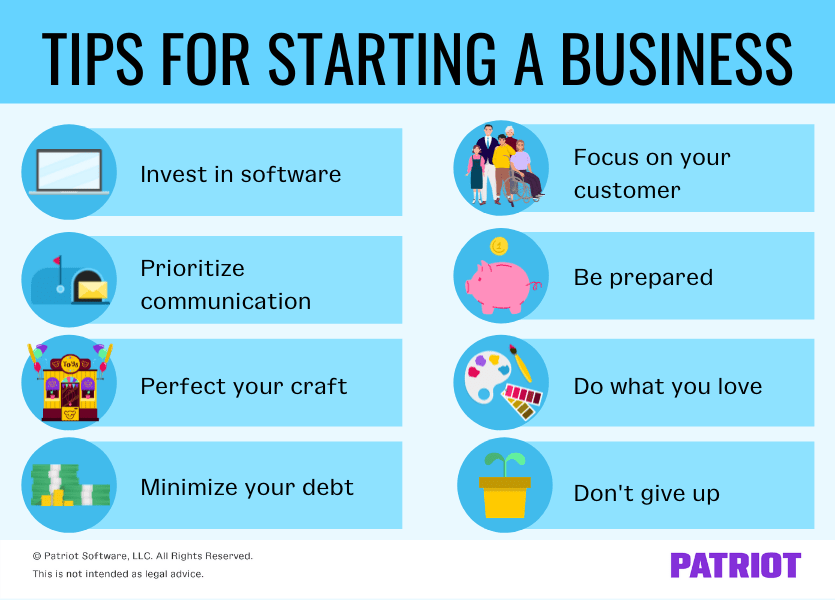What’s the magic formula for business success? Well (cue incorrect buzzer noise from game show), there isn’t one. But there are tips for starting a business that you can use to reach your unique business success formula.
Tips for starting a business from actual small business owners
Each month, we spotlight one of our small business customers to learn more about their ventures and what works for them. During each interview, we ask them, “What words of advice do you have for people hoping to start their own small business?”
We took some of the top tips for starting a business from small business owners who have been there, done that. Then, we organized them into the following eight tips.

1. Invest in software
Invest in a software product that helps your business run smoothly. Patriot has helped us immensely, and without them I know we would not be where we are financially today.” —Megan Every, Boss Cider Company
Do you use tools to streamline processes in your daily life, or do you do everything manually? Chances are, you use tools to save yourself some time and headaches.
If you plan on starting a business, you have to keep up-to-date and accurate accounting books for tax compliance and to monitor your financial health. And if you have employees or plan to have employees, you need to legally run payroll (e.g., withholding and remitting taxes).
Equip your venture with the necessary tools to streamline mundane tasks … like running payroll, managing your books, running an e-commerce business, sending out mass emails, and so on and so forth.
Investing in software can automate some of these tasks and give you more time to focus on growing your business. Plus, you can’t take shortcuts when it comes to staying compliant with federal and state regulations.
2. Prioritize communication
Communication is so key with potential clients and existing clients. I get so frustrated when I reach out to a contractor and they don’t get back to me for days. They’re busy, but if you want to make a good name for yourself, you have to get back to people as soon as possible. We have an office manager who takes calls on the weekend. Even though she isn’t working, she’ll get back to people as soon as possible.” —Steve Sentner, Paw & Order
When you start a business, you open the door to a profession that requires you to constantly communicate with different people, such as:
- Customers
- Business partners
- Employees
- Vendors
- Investors
- Lenders
If you let communication take the backburner, you’ll notice your connections with various contacts could start slipping. Forming a connection with another person is significantly easier when you get back to people quickly.
Not to mention, your revenue could start slowing as a reflection of poor communication. Customers trying to get in contact with you could give up and take their business elsewhere if they don’t hear back from you. And, you could miscommunicate key information.
3. Perfect your craft
…Really know your product or service—whatever you’re offering—and be really passionate about it. Think everything through and don’t be afraid. Stand behind what you’re offering, and offer something true to you that you’re passionate about, and everything else can be learned and will fall into place.” Rebecca Pham, Becca Cakes
Whatever it is you’re doing—selling something or providing a service—be the best at it. I know my wife and our trainers have that, and we’re the best in the business.” —Steve Sentner, Paw & Order
Business is about so much—organization, communication, tax compliance, growth, etc. But when you get down to it, the core of every business is the craft.
What is it that you want to do? Are you good at it? Do you have passion for it? Hopefully, the answer to these three questions is a resounding yes.
Then, you can take that passion and skill and perfect your craft. Whether you sell goods or provide services, being the “best in the business” is a title you probably aim to have.
Throughout business ownership, your passion and skills may start to dip. It’s easy to get caught in a routine and lose sight of why you’re doing it. To keep your passion and skills up to snuff, you can:
- Create a mission and vision statement
- Continue your knowledge with ongoing training
- Provide training to employees
4. Focus on your customer
Always make your clients/guests your number one focus. If you are kind, considerate, professional, and make every effort to meet the needs of your clients in a personal way, your business will be successful!” —Lisa Peterson, Airwell Bed and Breakfast
The customer is #1, right? According to more than two-thirds of businesses, that answer is yes. Customer experience is critical in today’s fast-paced climate. So if you want to stand out to consumers and compete with other businesses, you need to highlight your customer focus.
The relationship between consumers and a small business is the cornerstone of brand loyalty. By focusing on your customers and their unique needs, you can develop a connection that goes beyond selling to an unnamed consumer.
Here are just a few ways you can focus on your customers after starting a business:
- Getting on a first-name basis with customers
- Sending personalized offers
- Following up with your customers after a purchase
- Asking customers for feedback on ways you can improve
- Remembering how important humility is in business
Tips from successful business owners on customer focus revolve around personalization and kindness. Easy enough to remember.
5. Be prepared
Ask questions of anyone you can. Network with people, and don’t be afraid to make friends in the business sphere—because everyone has something to offer.” —Rachel Beard, The Harmony Garden Music Center
Research, research, research. Do as much research as you can and try to find a mentor you can confide in. This can be someone from your hometown or even out of state.” —Brittany Parker, Wink Boutique
Starting a business hurls you into an entire new world … a scary new world you’re probably not used to. How do you prepare for that?
Like anything new, you can prepare with a little research. Find out what other small business owners have done (oh wait, you’re doing that right now by reading this article!).
Here are some other ways you can prepare for starting a business:
- Conduct a market analysis
- Create a business plan
- Get all your licenses and permits in order
- Network with other business owners
- Line up some vendors
6. Do what you love
You’ve got to look at it in the long-run. You can’t expect your business to take off immediately. It’s like raising a child—you have to nurture it, baby it, raise it. And, you have to love what you’re doing. If you don’t love what you’re doing, you’ll burn out and then you’re just wasting your time.” —Michael Gee, Zen Dog Mobile Spa
…Find what it is you love doing and make money doing it. All businesses have their challenges. But if you love what you’re doing, you’ll make it through them. What matters is that you love what you do. If you love what you do, you’ll never work a day in your life.”—Dianna Borges, Borges Sleigh and Carriage Rides
I would say love what you do. Really, really love what you do. It’s not enough to only be passionate. You’ve got to absolutely love what you do because it’s a rocky road. You have to love it in good times and bad times.” —John Feghali, Toaster Party
If you’re starting a nonprofit or business, I think it’s important to get a core group of passionate people who are willing to invest their time in the organization. If they see the vision and understand the value it brings to the community, then it will succeed. Otherwise, it’ll be a struggle to get things going and achieve your vision or mission. So, the people are really an important part of that.” —Jon Kehl, Crown Community Garden
If you don’t love what you’re doing, you’re going to burn out quickly. When you start a business, you have to put hours into getting it off the ground. Patriot’s CEO Mike Kappel worked 70 – 80 hour weeks when he started his entrepreneurial journey. And he’s not alone.
According to a Gallup survey, 62% of small business owners work 50 or more hours a week. And, 57% said they worked six or more days a week.
Working long hours is going to be a challenge even if you love what you do. But, loving what you do is going to be a lot easier (and more long-term) rather than being indifferent to it.
7. Minimize your debt
I would say don’t jump the gun right away and go into debt. Take it slow, easy, and in manageable chunks. I think that’s the way to go. If you get a huge loan and jump the gun, it can get very risky.” —Gail Horn, The Soap Chest
And now for a financial tip: do what you can to minimize your debt. You might not be able to fully bootstrap your business. But, you may opt for alternative forms of financing. Rather than taking on large amounts of credit card debt or taking out a loan, start slowly.
Here are a few things you can do to minimize your debt when starting a business:
- Consider alternative forms of financing (e.g., angel investors)
- Make a budget and stick to it
- Work out of your home or rent an inexpensive office space
- Avoid over-ordering inventory
- Wait to hire employees
- Take things one day at a time
8. Don’t give up
My best advice is, number one: Be persistent and don’t give up. When you start a business or nonprofit, you’re going to encounter many hurdles at the beginning. But by being persistent, you will be able to do it. There are going to be days you want to stop—I assure you there were days that I was ready to say “That’s it” when we started LEAP due to all the hurdles. But then for us, that would be the day I got a phone call from one of the graduates, telling me that they were doing so well. And I would say to myself, “I have to do this, I cannot give up.” So be persistent.” —Gemma Garcia, Ladies Empowerment and Action Program (LEAP)
It takes a lot of time. There’s a quote that says “If you work really hard, one day you can become the boss and work twice as hard.” It takes a lot of time, a lot of ability to assess yourself and your motivations, and kind of step back and realize you can’t do everything at once.” —Brandon Hartman, Second Time Books
…Do one little step every day. Complete one line on a form. Make one phone call. Send one email. Every day, you do one thing. If you do one thing consistently every day, you will get ahead. It can be very overwhelming to look at all of the steps at once, but as long as you take one step a day, you’ll get there.” —Renata Papadopolous, Lovely Cakes
There’s no way to sugarcoat it: starting a business is difficult. Again, entrepreneurship requires long hours and hard work, especially when you’re just starting out. Not to mention, it takes most businesses two – three years before becoming profitable.
To help you during the growing pains of entrepreneurship, consider:
- Setting reachable goals
- Measuring your progress
- Writing down your mission and vision
- Hiring employees to give you a helping hand
- Taking it one day at a time
- Talking to other business owners about their experiences
| Want to read more of what these great small business owners have to say? Check out our Patriot Spotlight page to find their stories! |
This is not intended as legal advice; for more information, please click here.



